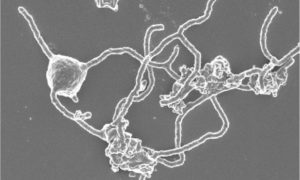by H. Devlin, January 15, 2020 in TheGuardian
For the first 2 billion years, life on Earth comprised two microbial kingdoms – bacteria and archaea. They featured an innumerable and diverse variety of species, but, ultimately, life on Earth was not that exciting judged by today’s standards.
Then, the theory goes, a rogue archaeon gobbled up a bacterium to create an entirely new type of cell that would go on to form the basis of all complex life on Earth, from plants to humans.
Now, for the first time, scientists have succeeded in culturing an elusive species of archaea believed to be similar to the ancestor that gave rise to the first sophisticated cells, known as eukaryotes. The work has been described as a “monumental” advance that sheds new light on this evolutionary milestone.
Nick Lane, professor of evolutionary biochemistry at UCL, described the work as “magnificent”, while a commentary by two other experts in the field said it marked a “huge breakthrough for microbiology”.
Like bacteria, archaea continue to thrive on Earth today. But despite the pivotal role they are thought to have played in the emergence of complex life there has been relatively little research on them. Many species are found in inhospitable environments and are incredibly difficult to grow in the lab.
The Japanese team behind the latest advance has dedicated 12 years to the effort, overcoming a series of setbacks along the way.

The archaeon which was cultured and characterised from deep marine sediment. Photograph: Nature
…
